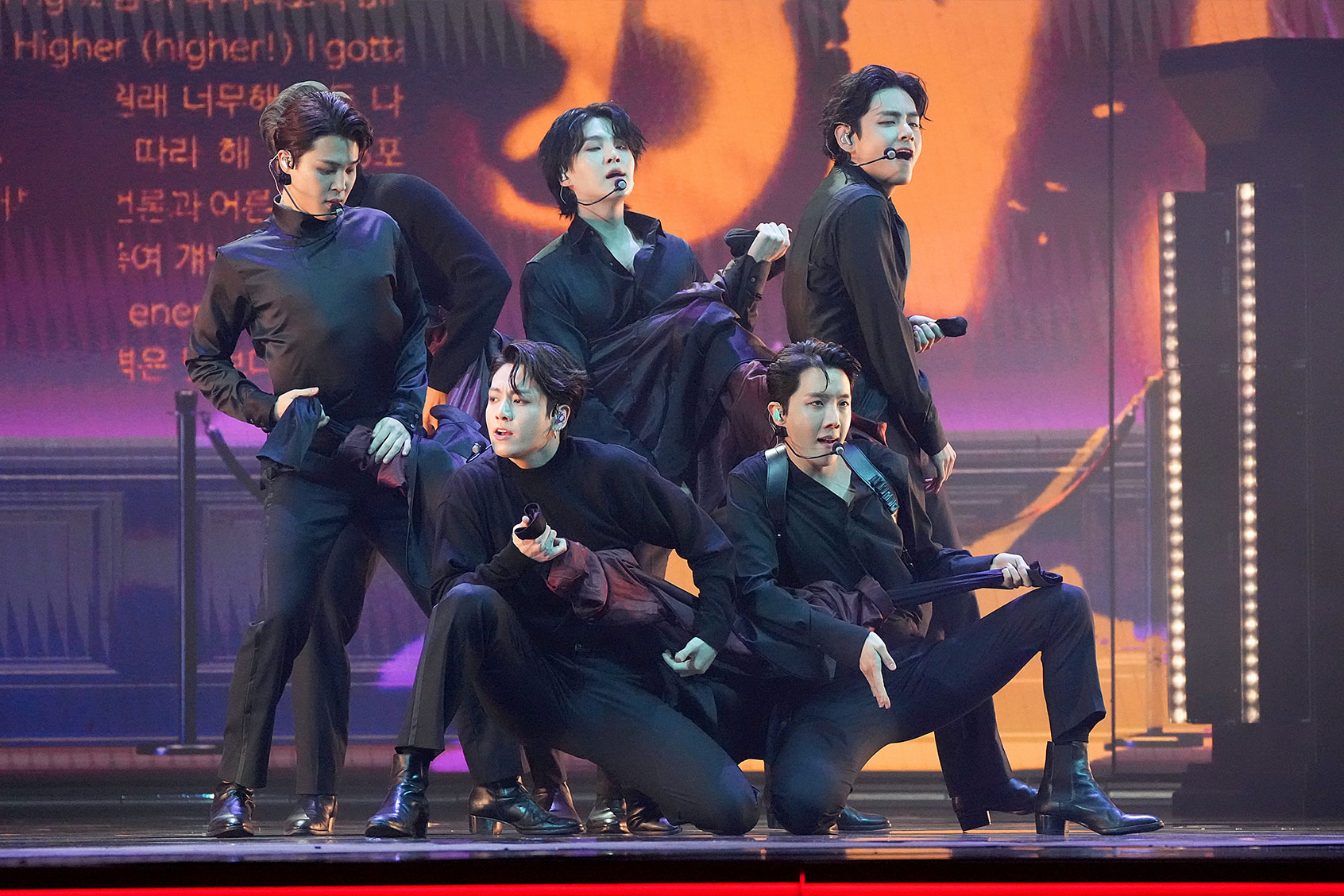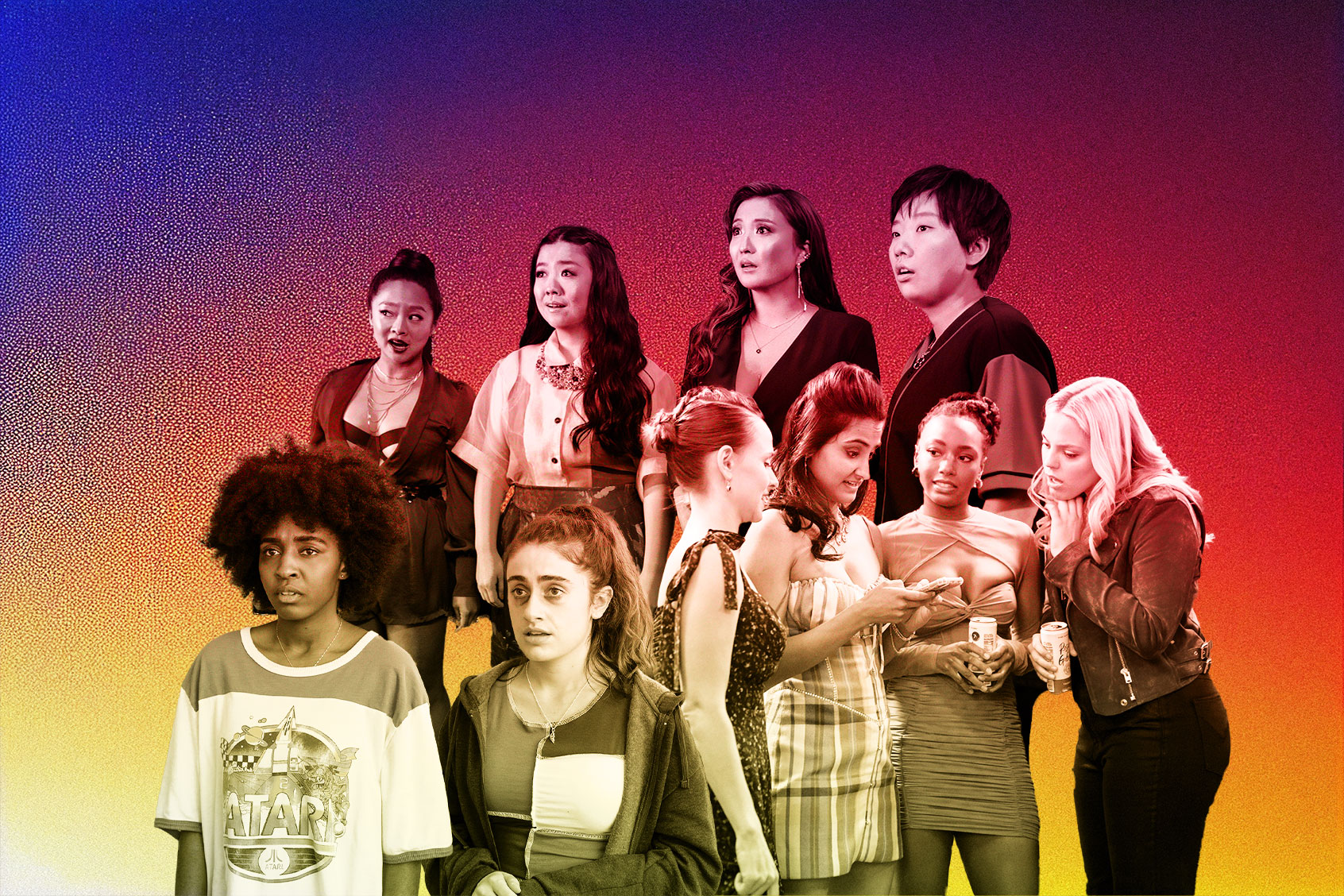It is a truth once almost universally debated that women enjoy sex, even desire it. It may not seem like it in Hollywood, when women are so often the ones being chased and coerced into having it à la “American Pie” or murdered for having sex (just check any slasher movie). But as radical as the idea (doesn’t) sound, it’s true — and it seems the big screen is finally catching on.
Women on screen are getting it on; women IRL are not.
“Bottoms,” the new campy comedy starring Rachel Sennott and Ayo Edebiri, is the latest example. The movie, which follows two self-described “ugly and untalented gays,” is full of coochie references and raunchy jokes. Like a gender-inverted “Superbad,” Sennott and Edebiri’s characters start a high school fight club under the false pretense of going to juvie and believing in women’s solidarity all in an effort to have sex with the school’s hot cheerleaders. From start to (ahem) finish, the duo is not shy about their sexuality and feral horniness for their love interests.
The movie follows a rising number of raunchy women comedies in movies and TV who follow desire on their own terms. We see this in “Joy Ride,” the directorial debut of Adele Lim that follows a friend group on a road trip in China. Along the way, the film’s women — played by Stephanie Hsu, Ashley Park and Sherry Cola — embark on their own sexual pleasure at the direct harm of the men’s well-being. Another gender reversal lies in “Sex Lives of College Girls,” the coming-of-age Max comedy from Mindy Kaling and Justin Noble that focuses on its strong cast of women in an academic setting rather than from the tired perspective of horny jocks. Bela (Amrit Kaur) is the series’ vocally horny queen, who introduces herself as “ready to smash some Ds” in the very first episode.
It’s about time women got to be in charge of their sexual desire rather than have it be something acted onto them. But it’s peculiar that now of all times there’s a rise in vocally thirsty young women on screen when sex is at an all-time low. According to a study in the Archives of Sexual Behavior, people of all ages from 2009 to 2018 are having less sex. More recently, women are throwing in the towel, as headlines in 2022 reported it was the “year of the femcel” and time for the “femcel revolution.” The involuntarily celibate women (female incels) are not alone, either. This year has seen a rise in volcels (voluntary celibate people). Abstinence is firmly in vogue with the hashtag #celibacy amassing over 200 million views on TikTok. In January there was a 90% increase in searches for celibacy according to Google trends data.
In this case, life does not imitate art. Women on screen are getting it on; women IRL are not. The rise of feral horned-up women in the media is a reflection of a turning point in the sexual landscape in which women are finding sexual liberation in themselves — not partners.
The pandemic, as well as the loss of reproductive rights, hammered home the failure of the sexual revolution.
The latest sex recession can be traced back to the pandemic which helped create conditions for women to not only take a step back from hookup culture but also reflect on how much it mattered to them in the first place. For Huck Magazine, Katie Tobin investigated “Why more young women are turning to celibacy,” finding that more women are disillusioned about dating when the sexual playing field is rife with power imbalances. A large part of this was due to the increase in conversations about what consent is, especially as more labels that describe toxic and manipulative dating behavior — like gaslighting, love-bombing or woke-fishing — became a part of the everyday vernacular.
“I got lulled into a false sense of security that this man is better as he knows all the right language,” a woman tells Tobin, as she reflects on how he fed her the right buzzwords to give the impression that he was emotionally mature and woke. “And before I know it, they’ve hurt me in a different way, but it would take longer for me to realize. I don’t have the energy to do this anymore; I’d rather just give up sex completely.”
We need your help to stay independent
The fall of Roe v. Wade added more fuel to the fire. Insider reported that Gen Z is swearing off men and avoiding intimacy post-Roe. If it wasn’t enough for women to have to wade through the murky and coercive parameters of consent and the threat of violent consequences for saying no, they also have to contend with a possibility of an unwanted pregnancy. It’s not the sexiest of situations.
The pandemic, as well as the loss of reproductive rights, hammered home the failure of the sexual revolution. Beginning in the ’60s, feminists fought for the truth that women also enjoy sex, and that it was a double standard for them to be shamed for participating in it just as much as men do. The birth of the contraceptive pill and developments in the gay rights movement helped liberalize the parameters of sexuality in America, setting the stage for feminists to focus on sex positivity. While this wave of feminism has importantly helped fight against slut-shaming, it also sold a false premise that women could hump their way to freedom.
South Korea may be feeding the wet dream fodder, but that doesn’t mean they’ve escaped the sex recession.
This is the argument that Louise Perry makes in her book, “The Case against the Sexual Revolution.” She argues that these sex-positive feminists “made the error of buying into an ideology that always best served the likes of Hugh Hefner and Harvey Weinstein.” In hindsight, encouraging women to rub one out in order to “be free” when the system is still very much against them is a bit like sending out troops to a battlefield rigged with landmines.
Of course this is not to say that women should not have sex. Rather, simply having more sex or trying more positions is not the path toward sexual and gender liberation. And now, more women are coming to this realization and thus taking a step back from the hookup scene.
As women are having less sex, it makes sense that they’d act more feral than ever. But this is about more than sexual frustration, women are embracing their thirst: creating erotic scenarios inspired by Seattle Kraken hockey player Alex Wennberg (some even going too far to the point that Wennberg and his wife had to issue a statement), joining the online BookTok community to read all things smutty and steamy (even lining up outside for a new romance, erotic-themed bookstore in New York) and leaving very explicit comments under food porn content.
 Jimin, Jungkook, Suga, J-Hope, and V of BTS perform onstage during the 64th Annual GRAMMY Awards at MGM Grand Garden Arena on April 03, 2022 in Las Vegas, Nevada. (Kevin Mazur/Getty Images for The Recording Academy)Women are complete horn dogs when it comes to K-pop and K-dramas too, from the NSFW fanfictions women write based off of Korean boy bands to sultry video montages called fancams. South Korea may be feeding the wet dream fodder, but that doesn’t mean they’ve escaped the sex recession. Fertility rates in the country are so bad (declining to a record low fertility rate of 0.78 last year) that the government is playing matchmaker. A growing feminist movement in South Korea, called 4B, is taking things one step further, swearing off heterosexual dating, sex and marriage and even boycotting any men in their lives completely. All this is happening while South Korean idols like BTS’ Jung-kook and V are sites on which women project their sexual fantasies.
Jimin, Jungkook, Suga, J-Hope, and V of BTS perform onstage during the 64th Annual GRAMMY Awards at MGM Grand Garden Arena on April 03, 2022 in Las Vegas, Nevada. (Kevin Mazur/Getty Images for The Recording Academy)Women are complete horn dogs when it comes to K-pop and K-dramas too, from the NSFW fanfictions women write based off of Korean boy bands to sultry video montages called fancams. South Korea may be feeding the wet dream fodder, but that doesn’t mean they’ve escaped the sex recession. Fertility rates in the country are so bad (declining to a record low fertility rate of 0.78 last year) that the government is playing matchmaker. A growing feminist movement in South Korea, called 4B, is taking things one step further, swearing off heterosexual dating, sex and marriage and even boycotting any men in their lives completely. All this is happening while South Korean idols like BTS’ Jung-kook and V are sites on which women project their sexual fantasies.
Sorry boys, we actually don’t need you for us to be sexual.
Even in fashion, sex is back with a vengeance. The rise of the label Slut (non-practicing) captures this ethos. The new iteration of the word slut is not about your body count, but a lifestyle and aesthetic. It’s about wearing micro mini-skirts, being sexy, confident and empowered and yet . . . not having sex. As Tom George for i-D notes, people referring to themselves as slut (non-practicing) is “an ownership of a sexuality that is completely our own, expressed through the way we dress, the way we strut down the street whilst listening to Doja Cat, our horny bookstyling and thotty digital footprint.” Sorry boys, we actually don’t need you for us to be sexual.
Horny women on screen reinforce this “slut in vibes only” concept. They offer a way for non-practicing sluts to live vicariously through their sex adventures without the harm that comes with IRL meetups. While it may seem contradictory for these sex-centered movies and shows to be a symbol of the failure of the sexual revolution, sex in these depictions are not portrayed under the male gaze. In fact, some of them are violent but critically towards men.
In “Bottoms,” the women in the show almost reclaim violence, brutally punching and beating each other up in order to better defend themselves against men. This training prepares them for the brutal fight at the end of the movie as they face off against their high school’s rival football team. The girls don’t just win — they annihilate the boys, even impaling one man through his chest and killing him. When Josie (Edebiri) finally gets the girl at the end and kisses her, a bomb explodes behind them, as if hammering home the idea that women’s desire is a force to be reckoned with.
Want a daily wrap-up of all the news and commentary Salon has to offer? Subscribe to our morning newsletter, Crash Course.
Whereas the sexual revolution failed to create change as it continued to encourage sex on male terms, these raunchy comedies are told through the female gaze, letting women dictate when, where, how and who to sleep with. As more women rethink the typical scripts for sex, these movies offer a reminder: For so long sex has been defined by the straight, cis man — begin with penetration, then ejaculation, the end — but what would “mainstream” sex look like if men were not the default?
Media often reflects and reframes the rules of our dating behavior. With more movies and shows portraying sex on women’s terms, where will it take us next?
Read more
about this topic

